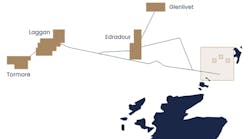IOG assessing next steps after North Sea Southwark gas well
Offshore staff
LONDON – IOG is suspending the A2 development well on the Southwark gas field in the UK southern North Sea following disappointing flow rates.
A remedial program to isolate three of the six stimulated zones and perforate two other zones within the Southwark A2 well has finished, with the well flow tested on a sustained basis to establish stable rates, and on a cycled basis.
While the operation successfully reduced water production from 1,500 bbl/d to 380 bbl/d, the stabilized gas rates were limited to 2.5 MMcf/d, at flowing wellhead pressure of 1,186 psi. These rates do not currently justify hooking up the well for production, the company said.
It now plans to assess the feasibility of cycled production and alternative longer-term remediation strategies, and the co-venturers will determine shortly on whether to resume drilling the Southwark A1 well as planned, or prioritize the Blythe H2 well (subject to regulatory approvals).
This would allow lessons from A2 to be incorporated into the A1 completion plan.
Blythe H2 would increase production rates and reserves recovery and limit water production, lessening onshore water handling requirements at the Bacton gas reception complex in Norfolk.
The drilling program under the existing rig contract includes two appraisal wells on the Goddard and Kelham North/Central structures.
IOG COO Dougie Scott said, “Moving forward, a key focus area will be assessing the viability of hydraulic stimulation in reservoirs with low column height above free water."
CEO Rupert Newall added, "We are clearly very disappointed with the Southwark A2 outcome, which is a very significant departure from our plans and expectations. We are already working hard to incorporate the data and learnings from A2 into the A1 well plan and will assess the implications for other similar assets in our portfolio…
“Recent engineering and procurement work gives us the option to accelerate Blythe H2…if successful, it would increase near term production and cashflow as well as significantly reducing water production and associated costs."
02.06.2023




